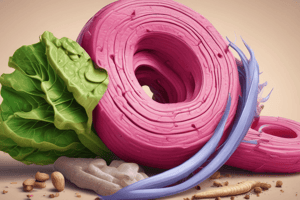Podcast
Questions and Answers
Which mineral is essential for building strong, healthy bones and teeth?
Which mineral is essential for building strong, healthy bones and teeth?
- Zinc
- Iron
- Calcium (correct)
- Potassium
Water makes up more than half of our body weight.
Water makes up more than half of our body weight.
True (A)
Name one food that is rich in potassium.
Name one food that is rich in potassium.
Bananas
Drinking _ to _ glasses of water every day is a healthy habit.
Drinking _ to _ glasses of water every day is a healthy habit.
Match the following minerals with their primary function:
Match the following minerals with their primary function:
What is the main benefit of roughage in our diet?
What is the main benefit of roughage in our diet?
A balanced diet contains only carbohydrates and proteins.
A balanced diet contains only carbohydrates and proteins.
Name one reason why reducing food wastage is important.
Name one reason why reducing food wastage is important.
A high-fibre diet helps maintain proper _____ weight.
A high-fibre diet helps maintain proper _____ weight.
Match the following food items with their preservation method:
Match the following food items with their preservation method:
Flashcards are hidden until you start studying
Study Notes
Fibre/Roughage
- Fibre is not digested but is crucial for digestion and waste excretion, preventing constipation.
- A high-fibre diet supports weight maintenance.
Balanced Diet
- A balanced diet includes essential nutrients: carbohydrates, fats, proteins, vitamins, minerals, roughage, and ample water.
- It is essential for overall health and fitness.
Reducing Food Wastage
- Overbuying leads to spoilage; only buy needed amounts.
- Cooking in smaller quantities helps avoid leftovers.
- Store perishable items in the refrigerator to reduce spoilage.
- Take smaller portions to minimize uneaten food.
Essential Minerals
- Key minerals include calcium, iron, potassium, manganese, copper, iodine, and zinc.
- Calcium strengthens bones and teeth; found in dairy and leafy greens.
- Iron aids oxygen transport; sources include red meat, lentils, and green veggies.
- Potassium regulates muscle and nerve functions; found in bananas and potatoes.
Importance of Water
- Water constitutes over half of body weight and is essential for all bodily functions.
- It aids digestion, nutrient absorption, and waste elimination.
- Drinking 6-8 glasses of water daily is recommended.
Carbohydrates
- Includes sugar and starches.
- Key sources: potatoes, rice, and various fruits.
Proteins
- Essential for building and repairing body tissues.
- Found in meat, fish, eggs, dairy, nuts, and pulses; crucial for growth in children and adolescents.
Fats
- Provide energy and cushion vital organs, protecting them.
- Sources include butter, oil, nuts, and cheese; excessive fat intake can lead to obesity.
Vitamins
- Essential for proper body functioning with unique roles for each type.
- Vitamin A supports vision and skin health; sources include dark green vegetables and dairy.
- Vitamin C promotes healthy skin and aids iron absorption; found in citrus fruits and peppers.
Human Teeth
- Two sets of teeth are developed: milk teeth (20) and permanent teeth (32).
- Permanent teeth types include incisors, canines, premolars, molars, and wisdom teeth, each serving different purposes.
Tooth Structure
- Parts of a tooth include:
- Crown: visible part covered by enamel.
- Dentine: main body beneath enamel.
- Pulp: contains nerves and blood vessels.
- Cementum: anchors tooth to jawbone.
Tooth Decay and Hygiene
- Tooth decay occurs due to acid from sugar-eating bacteria, forming cavities.
- Enamel can repair itself using saliva minerals, but persistent acid exposure leads to decay.
- Maintaining dental hygiene involves rinsing after meals, regular brushing, and minimizing sugar intake.
Dietary Impact on Teeth
- Milk is rich in calcium, protective against gum disease.
- Calcium and Vitamin C-rich foods help maintain strong teeth and healthy gums.
Studying That Suits You
Use AI to generate personalized quizzes and flashcards to suit your learning preferences.





